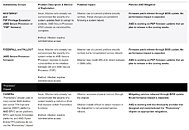- Joined
- Oct 9, 2007
- Messages
- 47,417 (7.51/day)
- Location
- Hyderabad, India
| System Name | RBMK-1000 |
|---|---|
| Processor | AMD Ryzen 7 5700G |
| Motherboard | ASUS ROG Strix B450-E Gaming |
| Cooling | DeepCool Gammax L240 V2 |
| Memory | 2x 8GB G.Skill Sniper X |
| Video Card(s) | Palit GeForce RTX 2080 SUPER GameRock |
| Storage | Western Digital Black NVMe 512GB |
| Display(s) | BenQ 1440p 60 Hz 27-inch |
| Case | Corsair Carbide 100R |
| Audio Device(s) | ASUS SupremeFX S1220A |
| Power Supply | Cooler Master MWE Gold 650W |
| Mouse | ASUS ROG Strix Impact |
| Keyboard | Gamdias Hermes E2 |
| Software | Windows 11 Pro |
On March 12, 2018, AMD received a communication from CTS Labs regarding research into security vulnerabilities involving some AMD products. Less than 24 hours later, the research firm went public with its findings. Security and protecting users' data is of the utmost importance to us at AMD and we have worked rapidly to assess this security research and develop mitigation plans where needed. This is our first public update on this research, and will cover both our technical assessment of the issues as well as planned mitigation actions.
The security issues identified by the third-party researchers are not related to the AMD "Zen" CPU architecture or the Google Project Zero exploits made public Jan. 3, 2018. Instead, these issues are associated with the firmware managing the embedded security control processor in some of our products (AMD Secure Processor) and the chipset used in some socket AM4 and socket TR4 desktop platforms supporting AMD processors.

As described in more detail above, AMD has rapidly completed its assessment and is in the process of developing and staging the deployment of mitigations. It's important to note that all the issues raised in the research require administrative access to the system, a type of access that effectively grants the user unrestricted access to the system and the right to delete, create or modify any of the folders or files on the computer, as well as change any settings.
Any attacker gaining unauthorized administrative access would have a wide range of attacks at their disposal well beyond the exploits identified in this research. Further, all modern operating systems and enterprise-quality hypervisors today have many effective security controls, such as Microsoft Windows Credential Guard in the Windows environment, in place to prevent unauthorized administrative access that would need to be overcome in order to affect these security issues. A useful clarification of the difficulties associated with successfully exploiting these issues can be found in this posting from Trail of Bits, an independent security research firm who were contracted by the third-party researchers to verify their findings.
The security issues identified can be grouped into three major categories. The table above describes the categories, the AMD assessment of impact, and planned actions.
AMD will provide additional updates on both our analysis of these issues and the related mitigation plans in the coming weeks.
View at TechPowerUp Main Site
The security issues identified by the third-party researchers are not related to the AMD "Zen" CPU architecture or the Google Project Zero exploits made public Jan. 3, 2018. Instead, these issues are associated with the firmware managing the embedded security control processor in some of our products (AMD Secure Processor) and the chipset used in some socket AM4 and socket TR4 desktop platforms supporting AMD processors.

As described in more detail above, AMD has rapidly completed its assessment and is in the process of developing and staging the deployment of mitigations. It's important to note that all the issues raised in the research require administrative access to the system, a type of access that effectively grants the user unrestricted access to the system and the right to delete, create or modify any of the folders or files on the computer, as well as change any settings.
Any attacker gaining unauthorized administrative access would have a wide range of attacks at their disposal well beyond the exploits identified in this research. Further, all modern operating systems and enterprise-quality hypervisors today have many effective security controls, such as Microsoft Windows Credential Guard in the Windows environment, in place to prevent unauthorized administrative access that would need to be overcome in order to affect these security issues. A useful clarification of the difficulties associated with successfully exploiting these issues can be found in this posting from Trail of Bits, an independent security research firm who were contracted by the third-party researchers to verify their findings.
The security issues identified can be grouped into three major categories. The table above describes the categories, the AMD assessment of impact, and planned actions.
AMD will provide additional updates on both our analysis of these issues and the related mitigation plans in the coming weeks.
View at TechPowerUp Main Site






